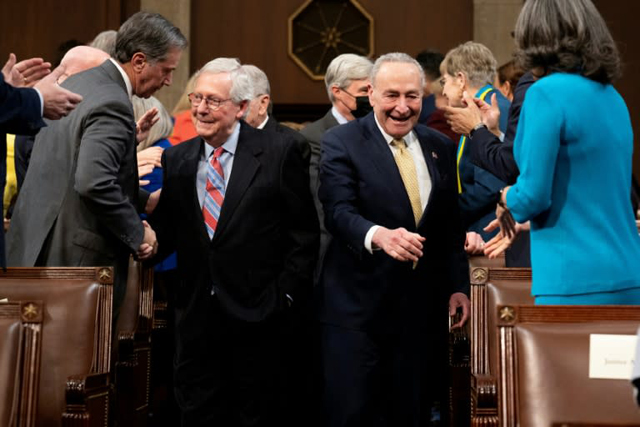
WASHINGTON, June 2, 2023 (BSS/AFP) - US senators voted to suspend the federal
debt limit Thursday, capping weeks of fraught negotiations to eliminate the
threat of a disastrous credit default just four days ahead of the deadline
set by the Treasury.
Economists had warned the country could run out of money to pay its bills by
Monday -- leaving almost no room for delays in enacting the Fiscal
Responsibility Act, which extends the government's borrowing authority
through 2024 while trimming federal spending.
Hammered out between Democratic President Joe Biden and the Republicans, the
measure passed the Senate with a comfortable majority of 63 votes to 36 a day
after it had sailed through the House of Representatives.
"No one gets everything they want in a negotiation, but make no mistake: this
bipartisan agreement is a big win for our economy and the American people,"
Biden said in a statement posted to social media.
He said he would sign the bill "as soon as possible" and address the nation
Friday.
Democratic Senate Majority Leader Chuck Schumer added that the nation could
"breathe a sigh of relief" after avoiding a "catastrophic" economic collapse.
"But, for all the ups and downs and twists and turns it took to get here, it
is so good for this country that both parties have come together at last to
avoid default," he said.
The bill -- which now heads to Biden's desk to be signed into law -- ended a
day of intense back-and-forth between party leaders and rank-and-file members
who had threatened the bill's quick passage with last-minute gripes about the
detail.
Democratic leaders had spent months underlining the havoc that a first
default in history would have wrought, including the loss of millions of jobs
and $15 trillion in household wealth, as well as increased costs for
mortgages and other borrowing.
- 'Behind the eight ball' -
The late evening drama came after a series of failed ballots on amendments
sought mainly by Republicans who were threatening at one point to hold up the
process, dragging it deep into the weekend.
Senators elected to offer 11 tweaks to the 99-page text, many objecting to
funding levels for their pet projects -- from border control and Chinese
trade to taxation and the environment -- and each requiring a vote.
Defense hawks upset at Pentagon spending being capped at Biden's budget
request of $886 billion threatened at one point to derail the bill's passage
entirely.
In the end they fell in line after being offered a commitment to a separate
bill providing cash for Ukraine's defense against the Russian invasion, and
promoting US national security interests in the Middle East and in the face
of Chinese aggression against Taiwan.
"As currently written, this bill puts our military behind the eight ball...
The first and most important dollars we allocate each year in the budget are
those to protect and defend the United States and our interests," said South
Carolina Republican Lindsey Graham.
America spends more money than it collects through taxation, so it borrows
money via the issuing of government bonds, seen as among the world's most
reliable investments.
Around 80 years ago, lawmakers introduced a limit on how much federal debt
could be accrued.
- Politically toxic -
The ceiling has been raised more than 100 times since to allow the government
to meet its spending commitments -- usually without drama and with the
support of Democrats and Republicans -- and stands at around $31.5 trillion.
Both parties see raising the debt limit as politically toxic, although they
acknowledge that failure to do so would plunge the US economy into a
depression and roil world markets as the government missed debt repayments.
Republicans hoped to weaponize the extension to campaign against what they
see as Democratic overspending ahead of the 2024 presidential election,
although hikes in the debt ceiling only cover commitments already made by
both parties.
Kevin McCarthy, the top lawmaker in the Republican-led House, had touted the
bill he spent weeks negotiating as a big victory for conservatives, although
he faced a backlash from hardliners on the right who said he had made too
many concessions on spending cuts.
He fell one short of the 150 votes -- two thirds of his caucus -- he had
promised to deliver in the lower chamber as he fought to quell a right-wing
rebellion, and needed Democratic help to advance the bill to the Senate.
On the other end of Pennsylvania Avenue, the vote was being touted as a major
victory for Biden, who managed to protect almost all of his domestic
priorities from deep cuts threatened by Republicans.